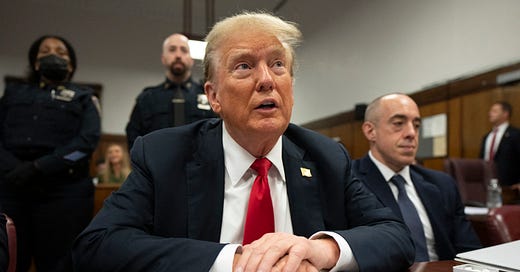Lies and Laws: Trump Criminal Fraud Case Going to the Jury at Last
Big uncertainties remain as the legally complicated, politically historic case moves into its last phase.
ON TUESDAY, THE JURY IN THE CRIMINAL CASE against Donald Trump on thirty-four counts of falsifying business records in the first degree heard closing arguments. The charges require that the prosecution show that the defendant caused false entries in a business record, intending to defraud, and did so in order to commit or conceal another underlying crime. Before the case goes to the jury on Wednesday, the judge must decide what law the jurors will see when they deliberate. This is a crucial issue. Justice Juan Merchan has to get it right, because otherwise there could be an unwarranted, unappealable acquittal; a hung jury; or grounds for reversing a conviction on appeal.
The parties stipulated to a lot of common ground in their respective jury-instruction requests, but there are several key differences in the proposals. First, the prosecution asked Merchan to include in the instructions the fact that Michael Cohen was convicted of the underlying crime here (his plea bargain in 2017 over the hush money payments at issue). That instruction would indicate to the jury that, as a matter of law, the crime that Trump allegedly tried to use false business records to conceal—election law violations—was admittedly committed by Cohen, undermining the defense’s argument that payments like these are not illegal.
The defense asked the judge to add the word “willfully” to the jury instructions’ reference to the very same election law violations, as well as language telling the jury that the law in place during the 2016 election allowed candidates to contribute unlimited funds to their own campaigns and that personal costs that arise due to a candidacy are not necessarily campaign expenses, including legal fees.
So, after weeks of trial, a key dispute is still whether the crime charged is even a crime. Early in the case, Merchan denied a motion to dismiss the indictment on that basis, but the argument lingers, and it could persuade at least one juror not to convict.
The defense also urged the judge to include a statement that, for falsifying business records, “a person acts with intent to defraud when his or her conscious objective or purpose is to lead another into error or to disadvantage.” This instruction could potentially lead jurors to refuse to convict, because they may think that Trump’s falsification of records did not actually lead anyone into “error or disadvantage.” If there was any error or disadvantage, the theory goes, it was caused by the electorate being denied information that may have led them not to vote for Trump—not by the internal business records. Again, this issue goes to whether Trump’s actions were criminal in the first place.
THE DEFENSE TEAM’S closing arguments on Tuesday were largely spent denying that a crime had been committed and insisting that the prosecution’s main witness was unreliable. “This case is not about an encounter with Stormy Daniels eighteen years ago,” Trump’s lead attorney Todd Blanche told the jury. “This case is about documents; it’s a paper case.” He then pivoted to calling Cohen a liar, suggesting that the hush money to Daniels was instead a series of routine payments on a “verbal retainer agreement” for legal fees to Cohen. He then called Cohen a “G.L.O.A.T”—the greatest liar of all time (presumably betting that the jurors don’t know of his client’s excess of 30,000 lies while president)—and added that Trump was so busy being president that he didn’t know where the $35,000 checks that he signed were actually going. And by the way, Blanche claimed, the payment wasn’t even for hush money because the Daniels story was not a total secret—and even if it were meant to keep her quiet, Cohen made the payment (from his home equity line of credit) of his own accord and without the approval or collaboration of Trump.
Blanche implied that if a hush money conspiracy happened, it was between Cohen and Daniels to extort money from Trump, not between Cohen and Trump to dupe American voters in the days leading up to the 2016 election. “There were a group of people who wanted to take advantage of the election and ultimately extort President Trump,” Blanche said.
The thrust of the defense’s closing is familiar: Trump is the victim, and not the one who committed fraud—his underlings did it, and although Cohen went to jail for a similar crime, it doesn’t count as a felony for Trump because paying off a person to hide negative information from the electorate isn’t a crime: “It’s democracy.”
The prosecution’s closing argument, like its case in chief, was much longer and more detailed than the defense’s. Assistant District Attorney Joshua Steinglass painstakingly walked the jury through the details of the twenty witnesses and dozens of documents and other evidence (including an audio recording of Trump discussing a payment to Karen McDougal two months before the Daniels payment) the prosecution presented—both implicitly and explicitly contradicting the defense’s argument that the government’s case rests solely on the word of one liar, Cohen. His presentation stretched deep into the evening, with the jury finally being sent off at 8 p.m.
From the very beginning, this case has been criticized as being at best complicated in its legal reasoning, at worst rickety and untested. The government’s evidence probably defied most critics’ expectations, demonstrating that Trump was undoubtedly behind the entire scheme. Ultimately, the evidence might not matter as much as the law, as Blanche made clear from the very first day of trial. Whether this narrative is something that will finally mean Donald J. Trump is accountable to the rule of law is up to Merchan—and twelve of Trump’s Manhattanite peers.






